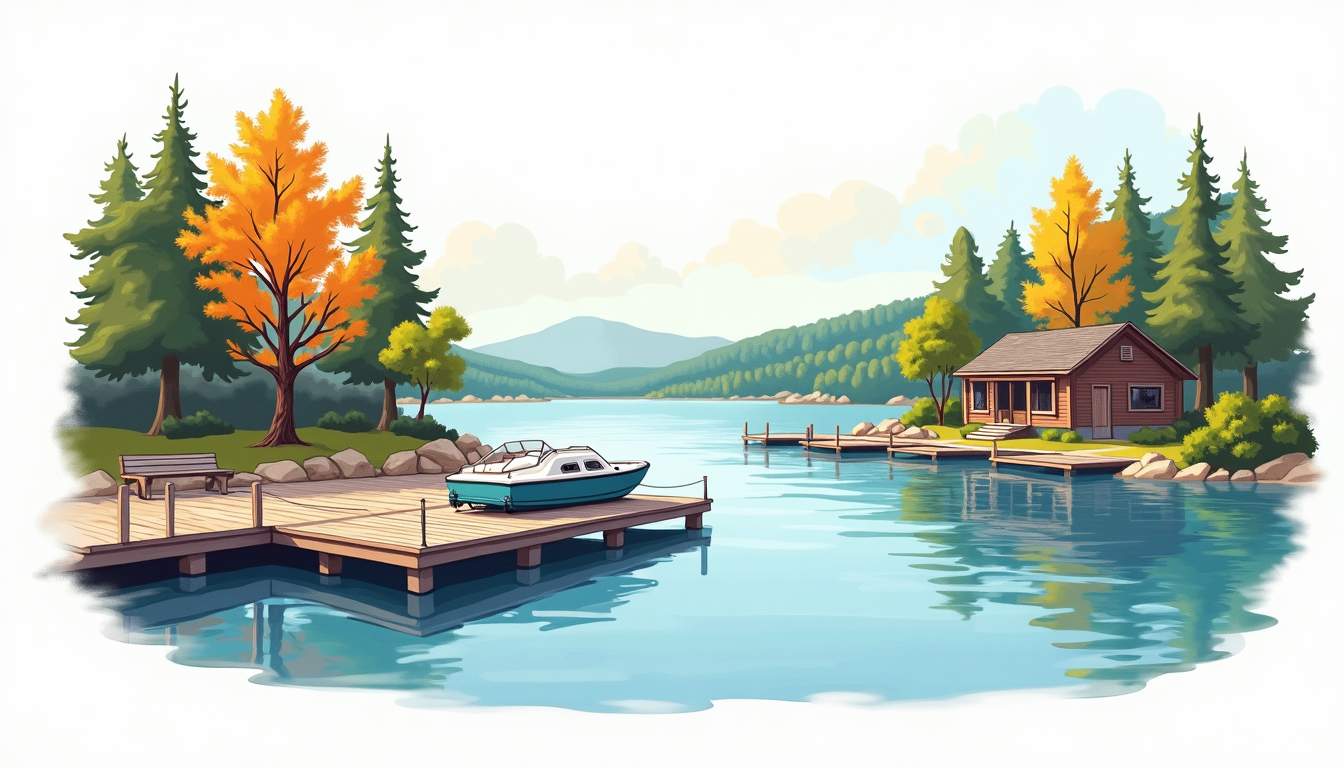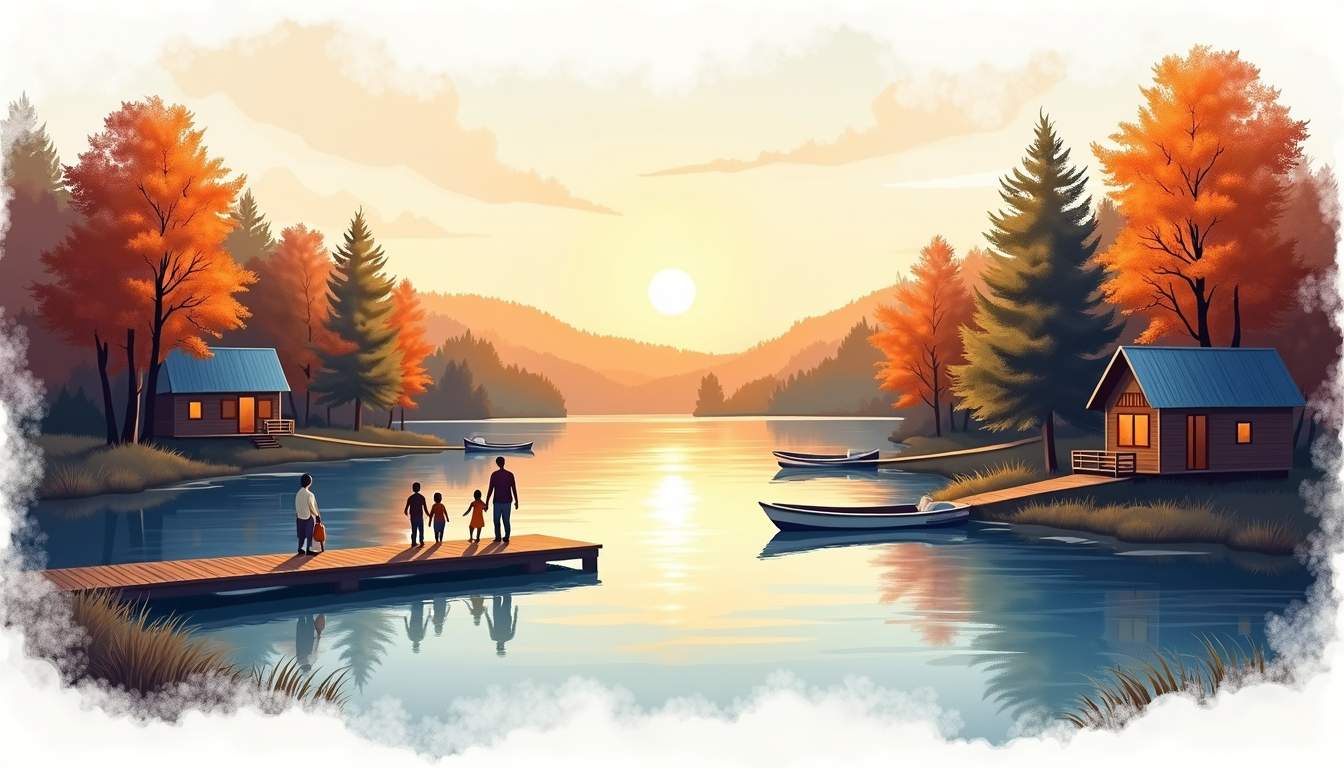Seasonal boating communities in Tennessee offer a unique blend of lake-living, social activity, and access to the state's natural beauty. From the expansive waters of Kentucky Lake to the winding coves of Douglas Lake and the legendary Tennessee River, these communities attract boaters, retirees, and families looking to make the most of the warmer months. This guide explores what to expect, where to look, how to choose the right community, and practical tips for making a seasonal boating lifestyle smooth and enjoyable.
Seasonal boating communities cater to people who want the pleasures of waterfront life without the year-round responsibility of maintaining a full-time residence. These neighborhoods typically offer marina access, boat storage, shared amenities, and a calendar of social events. That combination of convenience and community makes them attractive for those who spend spring through fall on the water and retreat inland for the colder months.
Many choose seasonal living for financial and lifestyle reasons. Seasonal homes tend to be smaller or designed for low-maintenance use, and common services like landscaping, security, and dock maintenance are often managed by associations. For boat owners, the convenience of nearby slips, pump-out stations, and boat ramp access is a major draw. For those who want a social scene, community events and clubs make it easy to meet people with similar interests.
In addition to practical benefits, these communities often foster a strong sense of camaraderie among residents. Shared summer activities such as fishing tournaments, boating lessons, and waterfront barbecues help build lasting friendships and create a lively, welcoming atmosphere. Many seasonal boating neighborhoods also prioritize environmental stewardship, offering education on sustainable boating practices and maintaining clean waterways to protect local ecosystems.
Furthermore, the seasonal aspect allows residents to fully embrace the rhythms of the boating lifestyle without the pressures of year-round upkeep. Many appreciate that they can enjoy the best of both worlds: vibrant waterfront living during the warm months and the flexibility to travel or pursue other interests during the offseason. This lifestyle balance makes seasonal boating communities particularly appealing for retirees, families, and anyone seeking relaxation along with active outdoor recreation.
Tennessee's diverse waterways create several distinct boating regions, each with its own character. The main hubs include the Tennessee River system, Pickwick and Kentucky Lakes, Norris and Douglas Lakes in the east, and smaller reservoirs and impoundments across the state. Each area brings different boating conditions, scenery, and community styles.
The Tennessee River corridor, including areas near Knoxville and Chattanooga, tends to attract family-oriented communities with a mix of weekenders and longer-stay residents. The Cumberland and Barkley Lake areas bring a relaxed, rural vibe with wide-open water and excellent fishing. Norris and Douglas Lakes offer forested coves and quiet anchorages for people seeking scenic retreats and opportunities for water sports.
The Tennessee River and Chickamauga Reservoir are popular among boaters who enjoy a long cruising range, good fishing, and easy access to urban amenities in cities like Chattanooga and Knoxville. Communities along these waters often have full-service marinas, community docks, and boating clubs that organize regattas, fishing tournaments, and social gatherings.
Kentucky Lake and Lake Barkley form one of the largest contiguous bodies of water east of the Mississippi. Seasonal communities here tend to emphasize recreation — water skiing, wakeboarding, and extensive cruising — and often include vacation-home developments that rent slips or properties during peak months. Wide channels and protected coves make this region especially accommodating for families and transient boaters.
In the eastern part of the state, Norris, Douglas, and Cherokee Lakes provide a more wooded, sheltered boating experience. This area suits boaters who prefer scenic cruising, smaller day trips, and quieter neighborhoods. Marinas here may be smaller but often deliver a cozy, community-oriented atmosphere.
When evaluating seasonal boating communities, several practical and lifestyle factors should guide decisions. Start by considering dockage policies, slip availability, and marina fees. Understand whether slips are leased, rented by the season, or accessible on a first-come basis. Some communities hold waiting lists for slips, while others include slip access as part of property ownership.
Beyond docking, amenities greatly affect quality of life. Look for boat storage, secure parking, pump-out services, fueling stations, and on-site maintenance. Also consider homeowner association rules, guest policies, and restrictions on short-term rentals if expecting to rent the property. Proximity to launch ramps, grocery stores, medical facilities, and regional airports can be crucial for comfort and safety.
Seasonal communities vary in social atmosphere. Some emphasize active social calendars with holiday parties, fishing tournaments, and boating parades; others value quiet, low-key living. For those who enjoy organized activities, seek communities with active homeowner associations, clubs, or social committees. More private-minded boaters should inquire about noise ordinances, guest traffic, and transient boat restrictions to ensure compatible neighbors.
Maintenance responsibilities can differ widely. Some communities handle dock and common-area upkeep through HOA fees, while others require residents to pay additional marina maintenance or engage private contractors. Clarify who pays for dredging, bulkhead repairs, and seasonal dock removal. Knowing maintenance schedules and contingency plans for severe weather or flooding is essential, especially for boat storage and winterization arrangements.
Budgeting for seasonal boating living involves more than mortgage or lease payments. Seasonal slips, storage fees, insurance, and association dues add up. It helps to create a comprehensive budget that includes anticipated repairs, utility bills for the seasonal residence, and any transportation costs for traveling between primary home and seasonal property.

Insurance deserves special attention. Seasonal homeowners should verify that homeowner's policies cover the intended months and that boat insurance addresses storage periods and winterization. Some insurers offer discounts for homes that remain unoccupied during the off-season if proper security measures are in place. Also factor in sales taxes, utility turn-on/turn-off fees, and local permit costs related to docks and seawalls.
Many seasonal properties are marketed with income potential from short-term rentals during peak months. If rental income is part of the financial plan, review local regulations and HOA rules governing short-term tenants. Factor in management fees, cleaning costs, supply replacements, and marketing expenses. A realistic occupancy estimate will provide a clearer picture of likely revenue.
Preparing for a seasonal lifestyle includes logistical and safety planning. Establish a checklist for arriving at and leaving the seasonal property: winterization, pump-out, battery maintenance, and securing outdoor furniture. Maintain a relationship with a local marina or contractor who can handle emergency repairs, haul-outs, or winter storage when the community is closed.

Communication systems are also important. Join community mailing lists or social media groups to receive updates about dock work, weather advisories, and neighborhood events. Identify local towing and salvage services, and keep a documented plan for how to respond to floods, storms, or mechanical failures while away from the property.
Even in Tennessee's milder climates, proper winterization prevents costly damage. If a slip is seasonal, confirm whether the marina provides winter services such as shrink-wrapping, battery removal, and fuel stabilization. Dry storage facilities and covered storage are ideal if available. If a boat stays on-site, ensure bilge pumps, heat tape, and proper draining protocols are in place to avoid freeze damage during occasional cold snaps.
Boaters should stay informed about water levels, navigation hazards, and seasonal changes in shoreline features. Some lakes experience fluctuating water levels for flood control or dam operations, which can affect dock access and shallow areas. Carry updated charts, a reliable GPS, and communication devices. Completing a basic safety inspection before every outing reduces the risk of incidents.
Choosing the right seasonal boating community involves balancing lifestyle preferences, budget, and boating ambitions. Make a prioritized checklist: preferred lake, slip access, social atmosphere, proximity to services, and allowable property use. Visit communities during peak season to experience the social scene, assess marina operations, and talk to current residents about their experiences.
Working with a local real estate agent who understands seasonal boating markets helps narrow options and negotiate favorable terms. Agents familiar with these communities can clarify HOA covenants, identify hidden fees, and provide insights into slip availability and transfer policies. Attend open-house events, marina tours, and community gatherings to get a realistic sense of daily life.
Seasonal boating communities offer a special way to enjoy Tennessee's waterways without committing to year-round residency. The best experiences come from communities with transparent management, reliable marina services, and engaged neighbors who share a love for the water. Planning, due diligence, and a clear understanding of costs will ensure that seasonal living remains relaxing rather than burdensome.

Whether drawn to wide-open lakes for high-speed recreation, quiet coves for peaceful cruising, or family-focused neighborhoods with lots of social programming, Tennessee has seasonal boating communities that fit many lifestyles. Putting in the time to research regions, visit communities, and organize practical details will pay dividends in safety, comfort, and long-term satisfaction on the water.
Look into local marina directories, boating clubs, and county planning offices for dock regulations and permit requirements. Join online forums and social groups centered on Tennessee boating to get firsthand advice and recommendations. Ultimately, a thoughtful approach to choosing a seasonal community ensures the right mix of convenience, camaraderie, and access to Tennessee's most beloved waterways.
Ready to embrace a seasonal boating lifestyle in a luxury gated community? Tennessee National offers exclusive waterfront living with a private marina, scenic trails, and a Greg Norman Signature Golf Course, all set against the stunning backdrop of Tennessee’s natural beauty. Whether you prefer a move-in ready home or a custom build, our community provides the perfect blend of relaxation and recreation. Schedule a private tour today and explore how Tennessee National can be your ideal seasonal retreat.